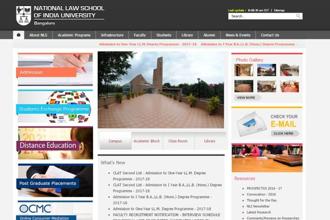

Karnataka higher education minister Basavaraj Rayaraddi said this year out of 80 students only two are from the state.
Bengaluru: The Karnataka legislative assembly on Tuesday unanimously passed the National Law School of India (Amendment) Bill 2017 which proposes to reserve 50% seats in the premier institution for students who are residents of the state.
State higher education minister Basavaraj Rayaraddi presented the bill to amend the National School of India Act 1986 (Karnataka Act 22 of 1986) on behalf of the law minister in the assembly on Tuesday.
“This year out of 80 students, only two are from the state,” Rayaraddi said, while adding that the institution must reserve at least 50% for students from the state. Although the bill presented on Tuesday originally demanded a 30% reservation, the minister revised the number to 50% on the insistence of Bharatiya Janata Party (BJP) legislators who form the main opposition on the floor of the house.
The bill will now be sent to the upper house.
The minister said reservation was necessitated by the fact that other states such as Andhra Pradesh and Telangana had deployed similar measures to protect the interests of their resident students.
“A student who or either of whose parents has resided in the state of Karnataka for a period of not less than ten years preceding the qualifying examination,” the bill reads in reference to the meaning and criteria for ‘resident student’.
The optional criteria was that the student must have studied in any of the recognised educational institutions in the state for a period of five years preceding the qualifying examination.
K.G.Bopaiah, BJP legislator from Kodagu, said the criteria was of short tenure and insisted on students who were born in the state. Rayaraddi said discriminating on the basis of birth place would be against Constitutional provisions.
After much deliberation, Rayaraddi changed the five-year term to seven on the lines of the common entrance test (CET)- an exam conducted by the government of Karnataka determining the eligibility for professional courses like engineering and medicine among other science based courses-rules.
The state assembly also passed The Karnataka State Universities Bill, 2017 to bring uniformity in monitoring and functioning of the seven universities acts in existence in the state.
“The Karnataka State Universities Bill, 2017 brings together all the state universities existing under the purview of the Department of Higher Education under one umbrella, to ensure that there are common rules to be followed by all of them regarding their administration and functioning,” the bill states. Members of the BJP staged a walkout after heated discussions as the provisions of the bill are expected to cut the powers of the chancellor.
“The chancellor shall exercise all the powers in consultation with the state government for uniform, speedy and effective decision making process,” the bill states.
[“Source-ndtv”]



